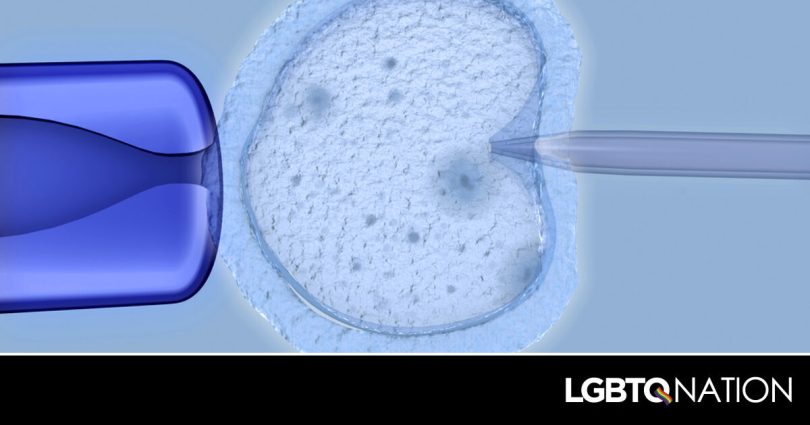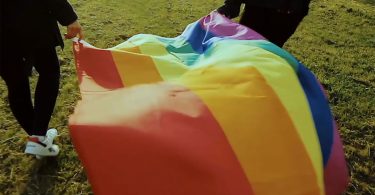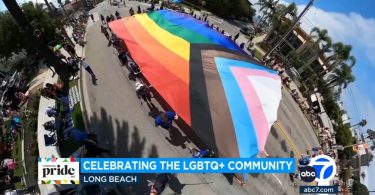The city of New York is discriminating against its gay male employees by denying them the same health care benefits as women and straight men, a new lawsuit alleges. Under the city’s insurance, employees are entitled to coverage for up to three rounds of in vitro fertilization (IVF) in their quest to have children—that is, unless they are gay men.
In a class action lawsuit filed Thursday, which appears to be the first federal case specifically about gay men’s access to IVF, a former city employee and his spouse claim that by denying them benefits available to all other employees, the city is engaging in discrimination based on sex and sexual orientation. Nothing else, they argue, explains why they were treated differently.
“There is no legitimate, non-discriminatory explanation for why the City’s healthcare plan would offer IVF benefits when the male plan participant’s partner is female but withhold IVF benefits when the male plan participant’s partner is male,” the complaint, filed in federal court in New York, states.
Insights for the LGBTQ+ community
Subscribe to our briefing for insights into how politics impacts the LGBTQ+ community and more.
New York City offers generous IVF benefits to its 300,000 employees and their dependents, including for single women, women in same-sex relationships, and men with female partners. This coverage extends to couples that plan to use donor eggs. The only exception is for gay men.
The city requires people wanting to access IVF services to be infertile, which it defines as an inability to conceive through heterosexual sex or intrauterine insemination—a set of criteria which disqualifies only gay men. Last year, the American Society of Reproductive Medicine updated its definition of infertility to include LGBTQ people, but New York City has not yet followed suit. The city’s infertility requirement, according to the complaint, leads to sex discrimination in violation of Title VII of the 1964 Civil Rights Act, state and city human rights laws, and the New York and United States constitutions.
The story behind the lawsuit goes back to 2017, when Corey Briskin began working as a prosecutor at the Manhattan district attorney’s office. He and his husband, Nicholas Maggipinto, were ready to start a family and looked forward to taking advantage of the city’s IVF benefits. They were surprised and deeply saddened when their request to use those benefits was quickly denied. The couple petitioned the city to change its policy to no avail.
The city’s refusal was both a financial and an emotional blow. There was “an additional kind of pain which was rooted in my sacrifice that I had made to be a public servant,” Briskin told Mother Jones. “To know that I was working alongside other public servants who had made a similar sacrifice, but yet were being given the opportunity to grow their families with the support of our employer, of the city—that had a uniquely profound impact on me.”
They also felt that the city was sending the couple a message it didn’t want them to be parents, when compared to colleagues who had no trouble getting IVF covered. “‘You’re just outside of what we support,’” Maggipinto said. “That’s the way it felt.”
In 2020, New York state mandated that health care plans serving over 100 employees offer IVF benefits, and barred discrimination based on sexual orientation. That same year, in the landmark case Bostock v. Clayton County, the United States Supreme Court ruled that Title VII the 1964 Civil Rights Act prohibited workplace discrimination on the basis of sexual orientation and gender identity. But despite these developments, the city refused to change its policy and cover IVF for Briskin and Maggipinto. So in 2022, the couple filed a class action charge with the Equal Employment Opportunity Commission, a necessary step before filing a Title VII case in federal court.
At first, the city’s only response to the EEOC proceedings was a statement defending its policy on the grounds that it does not provide benefits to surrogates. But not only had Briskin and Maggipinto not asked the city to cover the cost of a surrogate, according to Peter Romer-Friedman, the couple’s lawyer, the EEOC discovered that the city would provide IVF benefits to couples using a surrogate—as long as it wasn’t a gay male couple. The EEOC investigation dragged on for two years. In March, officials greenlit the couple’s lawsuit.
“The city should be embarrassed by what they filed at the EEOC,” says Romer-Friedman. “It didn’t grapple with the actual allegations. It didn’t provide real facts or real law when it comes to these issues.”
While members of New York’s city council have twice introduced legislation to make its IVF policy inclusive of gay men, including this year, it has not passed. Romer-Friedman believes that Mayor Eric Adams and the city’s Office of Labor Relations could change the policy unilaterally, and, under the state law mandating IVF coverage, have a responsibility to do so.
“Whether or not they agree with us legally, it’s wrong and unfair,” says Romer-Friedman. “And it’s not as if the cost of these benefits would make a difference to the city. It’s a rounding error when you consider how much money the city spends on health care for city employees, spouses, children, retirees.”
The complaint names the city as the defendant along with Adams, his predecessor Bill deBlasio, and the current and former commissioners of the Office of Labor Relations. The mayor’s office did not immediately respond to a request for comment.
The city’s intransigence has been both baffling and hurtful to Briskin and Maggipinto. “I was actually really hopeful that this was an issue of oversight, that they just didn’t realize,” says Maggipinto. “I still am stunned that this is going on for this long. It really makes me question the motives of the individuals making the decisions at City Hall.”
In 2022, Briskin left the district attorney’s office for a clerkship. The following year, the couple began paying for IVF. That’s when “I made the tough decision to jump ship and move into the private sector, mainly because we had mounting bills related to our family building journey,” Briskin said. “Yet another impact of the policy on our lives.”
In filing this class action, the couple hope not only to recoup their expenses and change New York City’s policy, but to set precedent under Title VII that would help countless other gay people trying to start families. As employers increasingly include IVF in benefits packages, including for LGBTQ employees, in recent months, courts have begun to see workplaces that deny such benefits to LGBTQ people as a form of sex discrimination. Last week, Aetna settled a lawsuit filed by a lesbian couple that had to pay out of pocket for fertility treatments. As of last fall, 21 states require some employers to provide fertility coverage of some kind, but only eight of them include LGBTQ and single people. New York is one.
“This is one of the most important questions after the Bostock decision that federal courts could answer about the rights of gay and lesbian employees,” says Romer-Friedman. The city’s current policy, the lawsuit points out, encourages all groups to start a family except gay men—the one group that will always need IVF in order to have biological children.
This article first appeared on Mother Jones. It has been republished with the publication’s permission.







